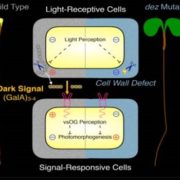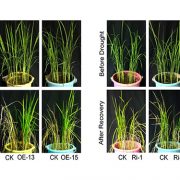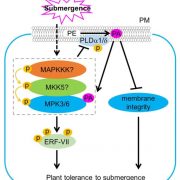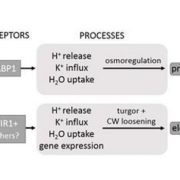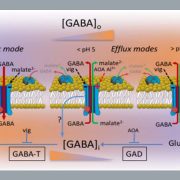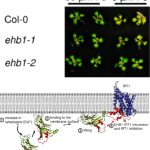Post-transcriptional regulation of FLOWERING LOCUS T modulates heat-dependent source-sink development in potato (Curr Biol)
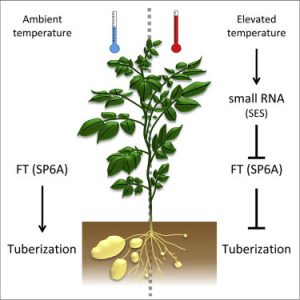 Tuber formation (tuberization) in potatoes is controlled by both endogenous and environmental signals particularly day length and temperature. Long days and high temperature impede tuberization while it is enhanced by short days and low temperature. When conditions are favourable for tuberization, shoot-derived mobile signals are translocated into the root where tuber formation is activated. It was previously shown that the FLOWERING LOCUS T (FT) homolog SP6A encodes one of these tuberization signals. In addition, SP6A expression is controlled by both day-length and temperature. However, the molecular mechanism mediating this outcome is unknown. Lehretz et al. showed that the overexpression of a codon optimized SP6A resulted in early tuberization and additional tuber growth as a result of altered meristem identity in potato. They identified a novel small RNA that targets SP6A. Its expression increases under elevated temperature and downregulates the expression of SP6A. By overexpressing a target mimicry construct, higher transcript level of SP6A and tuberization was observed even at elevated temperature, suggesting that inhibition of tuberization at high temperature as a result of downregulated SP6A is modulated by a small RNA. Although the detailed mechanism of this small RNA action is not yet known, the authors elegantly show that SP6A is regulated at the post-transcriptional level by a temperature controlled small RNA. (Summary by Toluwase Olukayode). Curr. Biol. 10.1016/j.cub.2019.04.027
Tuber formation (tuberization) in potatoes is controlled by both endogenous and environmental signals particularly day length and temperature. Long days and high temperature impede tuberization while it is enhanced by short days and low temperature. When conditions are favourable for tuberization, shoot-derived mobile signals are translocated into the root where tuber formation is activated. It was previously shown that the FLOWERING LOCUS T (FT) homolog SP6A encodes one of these tuberization signals. In addition, SP6A expression is controlled by both day-length and temperature. However, the molecular mechanism mediating this outcome is unknown. Lehretz et al. showed that the overexpression of a codon optimized SP6A resulted in early tuberization and additional tuber growth as a result of altered meristem identity in potato. They identified a novel small RNA that targets SP6A. Its expression increases under elevated temperature and downregulates the expression of SP6A. By overexpressing a target mimicry construct, higher transcript level of SP6A and tuberization was observed even at elevated temperature, suggesting that inhibition of tuberization at high temperature as a result of downregulated SP6A is modulated by a small RNA. Although the detailed mechanism of this small RNA action is not yet known, the authors elegantly show that SP6A is regulated at the post-transcriptional level by a temperature controlled small RNA. (Summary by Toluwase Olukayode). Curr. Biol. 10.1016/j.cub.2019.04.027


